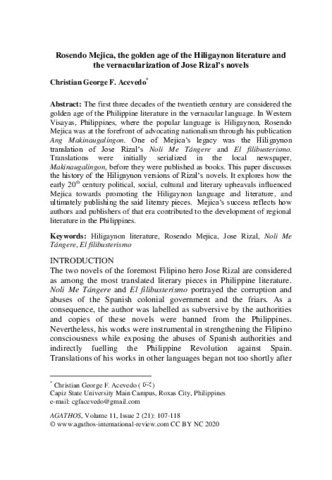Rosendo Mejica, the golden age of the Hiligaynon literature and the vernacularization of Jose Rizal’s novels
| dc.contributor.author | Acevedo, Christian George | |
| dc.coverage.spatial | Philippines | en |
| dc.date.accessioned | 2022-01-11T02:46:04Z | |
| dc.date.available | 2022-01-11T02:46:04Z | |
| dc.date.issued | 2020 | |
| dc.identifier.citation | Acevedo, C. G. F. (2020). Rosendo Mejica, the golden age of the Hiligaynon literature and the vernacularization of Jose Rizal’s novels. Agathos, 11(2), 107-118. | en |
| dc.identifier.issn | 2069-1025 | |
| dc.identifier.uri | http://repository.capsu.edu.ph/handle/123456789/63 | |
| dc.description.abstract | The first three decades of the twentieth century are considered the golden age of the Philippine literature in the vernacular language. In Western Visayas, Philippines, where the popular language is Hiligaynon, Rosendo Mejica was at the forefront of advocating nationalism through his publication Ang Makinaugalingon. One of Mejica’s legacy was the Hiligaynon translation of Jose Rizal’s Noli Me Tángere and El filibusterismo. Translations were initially serialized in the local newspaper, Makinaugalingon, before they were published as books. This paper discusses the history of the Hiligaynon versions of Rizal’s novels. It explores how the early 20th century political, social, cultural and literary upheavals influenced Mejica towards promoting the Hiligaynon language and literature, and ultimately publishing the said literary pieces. Mejica’s success reflects how authors and publishers of that era contributed to the development of regional literature in the Philippines. | en |
| dc.language.iso | en | en |
| dc.publisher | “Alexandru Ioan Cuza” University of Iasi | en |
| dc.relation.uri | https://www.agathos-international-review.com/issue11_2/16.Acevedo.pdf | en |
| dc.rights | Attribution-NonCommercial 4.0 International | * |
| dc.rights.uri | https://creativecommons.org/licenses/by-nc/4.0/ | * |
| dc.subject | Hiligaynon literature | en |
| dc.subject | Rosendo Mejica | en |
| dc.subject | Noli me tangere | en |
| dc.subject | El filibusterismo | en |
| dc.subject | Jose Rizal | en |
| dc.subject.lcsh | Rizal, José, 1861-1896 | en |
| dc.subject.lcsh | Philippine literature | en |
| dc.title | Rosendo Mejica, the golden age of the Hiligaynon literature and the vernacularization of Jose Rizal’s novels | en |
| dc.type | Article | en |
| dc.citation.journaltitle | Agathos | en |
| dc.citation.volume | 11 | en |
| dc.citation.issue | 2 | en |
| dc.citation.firstpage | 107 | en |
| dc.citation.lastpage | 118 | en |
| dc.identifier.essn | 2248-3446 |
Files in this item
This item appears in the following Collection(s)
-
Journal articles published externally [23]
These are journal articles by CAPSU authors published externally.


